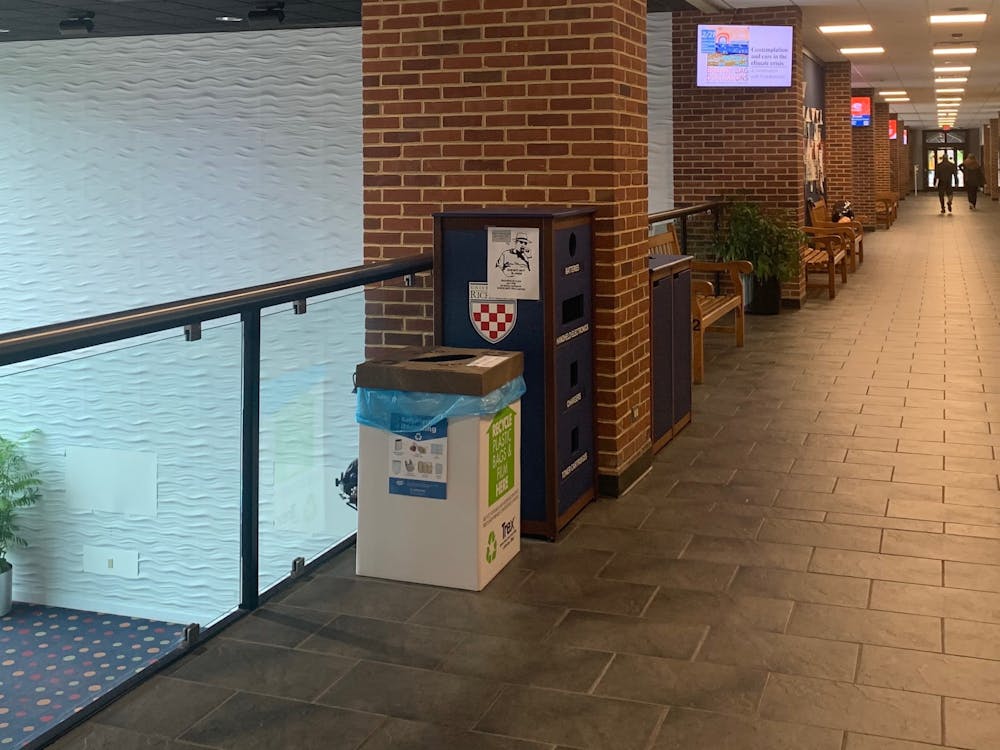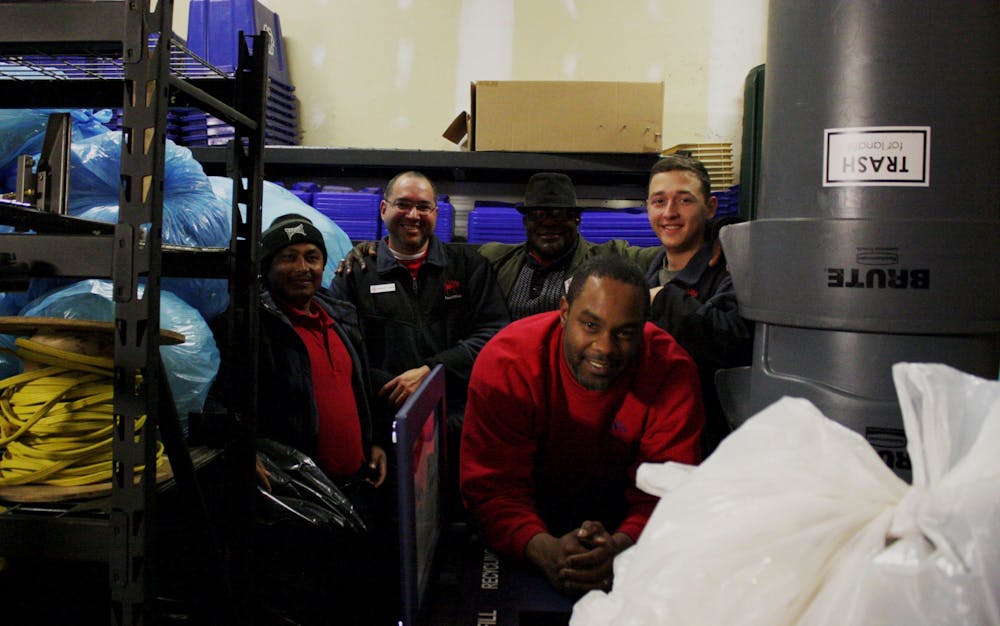After getting off work, Nancy Propst often goes to Target or Food Lion, or both. The stores are part of a route she’s developed — not for grocery shopping, but for dropping off bags full of plastic.
“I go [to the University Facilities warehouse] twice a week and grab seven, eight, nine bags, depending on how big they are,” Propst said, “and then spend the next two days dropping them off at places.”
Propst has worked out the route, not as part of her official duties as administrative coordinator for the department of geography and the environment and for several academic programs, but as the University of Richmond's coordinator of the Trex recycling program, which she brought to campus in November 2019.
The program challenges institutions to collect 500 pounds of soft plastic – such as plastic bags, bubble wrap and drink-case overwrap – in six months, according to its website. The reward? A free eco-friendly bench from Trex, a company that makes recycled decking and outdoor furniture.
At first Propst was worried there wouldn’t be enough plastic to meet the goal.
“When I originally set this up, I was like, ‘I don’t know if we’re going to hit 500 pounds,'" she said. "'I think we’re going to, but I don’t really know.'”
But what started out as a pilot program with moderate expectations expanded quickly. The Facilities team that collects and weighs the plastic from the six Trex collection boxes around campus is collecting easily more than 100 pounds a week, Propst said.

The Trex collection box in Tyler Hanes Commons, one of six locations around campus where students, faculty and staff can drop off soft plastic for recycling.
Propst, along with sophomore Isabelle Drayer and senior Caroline Schiavo, who both intern at the Office for Sustainability, regularly bring bags of plastic to Trex collection points at stores in the Richmond area. But there are still dozens of bags waiting to be dropped off.
“It’s blown up to so much bigger than what my expectations or thoughts ever could be,” Propst said, “which is really exciting and a little overwhelming at the same time.
“Every time when they send me the numbers, I’m like … I don’t know if I should be jumping for joy or crying for the amount of plastic.”
Collaborating with University Facilities
Enjoy what you're reading?
Signup for our newsletter
Those numbers are sent to Propst by Scott Lincoln, manager of Custodial and Environmental Services. He oversees the collection of the bags of plastic, and on Fridays sends Propst the total of pounds of plastic collected that week, he said.
“In my experience, one of the things that hinders a successful program is when there’s multiple entities trying to accomplish the same thing, but in different lanes,” Lincoln said. “[So] one of my roles when I became involved was to try to bring us together from a logistics standpoint.”
Lincoln’s team of six Facilities employees, James Campbell, Wa Hit, Jonathan LaPrade, Mauricio Lopez and John Shines, usually handles recycling specialized items such as batteries and books. Now, they also collect the bags of plastic for Trex.
“[The team is] super adaptable and very motivated,” Lincoln said. He emphasized that Facilities would not have started the program without thinking about how to manage it logistically.
“If we start a program and then realize halfway through [that it] isn’t sustainable and have to end it, that message is horrible,” he said. “It’s going to cause more damage than any productive accomplishments that we’ve made.”
Nonetheless, Lincoln acknowledged that getting the plastic to Trex had become difficult.
“We might collect 100 pounds a week, [but] Target doesn’t accept 100 pounds in one drop-off,” he said.
Propst echoed this concern.
“You can’t put more than two or three bags at a place,” she said.
Initially, Lincoln’s team stored the bags of plastic in their break room in the Physical Plant. Eventually, the bags overwhelmed the space, and they shifted to another, larger storage area in the plant.
The pile remains precarious. Propst said she had to be careful when selecting a bag to pull out so the pile didn’t collapse on her.
“We’re swimming in it,” one Facilities team member said while posing for a picture by the bags. “Drowning in plastic!”
Contributions from ETC
Eliot Cleveland, manager of Everything Convenience and Dean’s Den, knew from the start that reaching 500 pounds of plastic would not be a problem.
“We have plenty of plastic,” he said during an interview in his office in the ETC stock room, surrounded by plastic-wrapped cases of bottled drinks, snacks and other items.
“[Propst] was worried that we wouldn’t have enough, and I was like, ‘Look, we’re probably going to have too much.’”
There are two Trex collection boxes in the Heilman Dining Center, one in the lobby and one in ETC itself. The one in ETC is filled almost every day, Cleveland said.
“That made me realize, ‘Wow. We are producing so much more on campus than I think people are aware of,'” Propst said.
Cleveland agreed that ETC did more business than people probably realized -- and thus generated more plastic waste.
ETC is working toward sustainable solutions, Cleveland said. Since he started working there three years ago, ETC has introduced reusable water bottles, silverware, straws and other items, he said.
But the process is just that: a process.
“There’s a lot of concern about the [plastic] bottles,” Cleveland said. “And that’s all being worked on, [but] it’s not going to happen overnight.
“A lot of people really like bottled water.”
Looking toward long-term solutions
Propst initially hoped to collect enough plastic to get one bench to place in the Gambles Mill Eco-Corridor, a plot of land being developed on campus to restore Little Westham Creek and add a multi-use trail, according to the sustainability office website.
But now, her goal has shifted. Propst is working with Rob Andrejewski, director of sustainability, to compile the data from the plastic collection to show how much plastic waste is generated on campus – and to work toward more institutionalized solutions, she said.
“It’s an issue of how much plastic is there [in the first place],” Propst said.
Senior Amina Maslo, a student intern for the sustainability office, agreed. “I know there is a lot of inevitable packaging,” she said. “So for those items I think it’s great to have the Trex collection bins. But I think the first step should be reducing altogether.”
Andrejewski and Propst both highlighted UR’s commitment, made in its sustainability plan, to diverting 75% of waste from the landfill by 2025. Andrejewski said currently about a third of waste was diverted.
“If we don’t do something about the plastic,” Propst said, “[75% is] not going to happen.”
Although challenges to the program remain, the organizers of the Trex initiative are optimistic. Lincoln noted that the program has gotten positive feedback from all sides.
“[There are] a lot of people that want this to succeed,” he said. “It’s nice to see everybody getting on the same page.”
The program has sparked other conversations, such as whether campus recycles lightbulbs, Styrofoam and nitrile gloves, Propst said.
“The interesting thing has been all of the other little pieces that have come out of this one little idea,” she said.
Everyone interviewed for this article credited Propst for her initiative in starting the program.
“A single person willing to put in some effort can make a profound difference,” Andrejewski said. “[Propst] didn’t just have an idea – she had an idea and a willingness to make it a reality.
“It’s because of her that [the program] is successful, and it’s really inspiring to see.”
Propst plans to announce the up-to-date total of collected plastic in early March, she said.
Contact copy editor Caroline Fernandez at caroline.fernandez@richmond.edu.
Support independent student media
You can make a tax-deductible donation by clicking the button below, which takes you to our secure PayPal account. The page is set up to receive contributions in whatever amount you designate. We look forward to using the money we raise to further our mission of providing honest and accurate information to students, faculty, staff, alumni and others in the general public.
Donate Now



